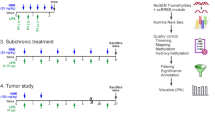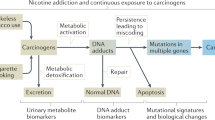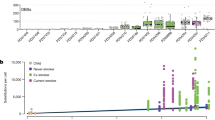Abstract
Lung cancer is the most common cancer in men in the United Kingdom and the second most common in women, accounting for between 25 and 40% of all cancer deaths1,2 Cigarette smoking is widely accepted as the major cause of lung cancer and linear relationships have been established between the number of cigarettes smoked and lung cancer risk3. Although approximately 50 carcinogenic chemicals have been identified in cigarette smoke4, a causal link between specific compounds and lung cancer has yet to be made. Studies on cigarette smokers' urine5,6, blood7–11 and placenta12 have provided indications of carcinogen exposure, and although the presence of covalently-bound adducts in human DNA provides evidence of exposure to carcinogens12–14, there have been no reports of systematic studies on the levels of DNA adducts in human lung. We report here, using the 32P-post-labelling technique15,16, that cigarette smokers have higher adduct levels than non-smokers, that there is a linear relationship between adduct levels and daily or lifetime cigarette consumption, and that people who have given up smoking for at least five years have adduct levels similar to those of non-smokers.
This is a preview of subscription content, access via your institution
Access options
Subscribe to this journal
Receive 51 print issues and online access
$199.00 per year
only $3.90 per issue
Buy this article
- Purchase on Springer Link
- Instant access to full article PDF
Prices may be subject to local taxes which are calculated during checkout
Similar content being viewed by others
References
Doll, R. & Hill, A. B. Br. med. J. ii, 1071–1081 (1956).
Yorkshire Regional Cancer Registry: Report for the Year 1985 Including Cancer Statistics for 1978–1983 (Yorkshire Regional Cancer Organisation, Leeds, 1986).
Doll, R. & Hill, A. B. Br. med. J. ii, 1271–1286 (1952).
Weisburger, J. H., Cohen, L. A. & Wynder, E. L. in Origins of Human Cancer (eds Hiatt, H. H., Watson, J. D. & Winsten, J. A.) 567–602 (Cold Spring Harbor, New York, 1977).
Putzrath, R. M., Langden, D. & Eisenstadt, E. Mutat. Res. 85, 97–108 (1981).
Yamasaki, E. & Ames, B. N. Proc. natn. Acad. Sci. U.S.A. 74, 3555–3559 (1977).
Obe, C., Vogt, H.-J., Madle, S., Fahning, A. & Heller, W. D. Mutat. Res. 92, 303–319 (1982).
Livingston, G. K. & Fineman, R. M. Mutat. Res. 119, 59–64 (1983).
Perera, F. P. et al. J. natn. Cancer Inst. 79, 449–456 (1987).
Tornquivst, M. et al. Carcinogenesis (Lond.) 7, 1519–1521 (1986).
Bryant, M. S., Skipper, P. L., Tannenbaum, S. R. & Maclure, M. Cancer Res. 47, 602–608 (1987).
Everson, R. B. et al. Science 231, 54–57 (1986).
Garner, R. C. Carcinogenesis (Lond.) 6, 1071–1078 (1985).
Phillips, D. H., Hemminki, H., Alhonen, A., Hewer, A. & Grover, P. L. Mutat. Res. 204, 531–541 (1988).
Gupta, R. C., Reddy, M. V. & Randerath, K. Carcinogenesis (Lond.) 3, 1081–1092 (1982).
Reddy, M. V. & Randerath, K. Carcinogenesis (Lond.) 7, 1543–1551 (1986).
Randerath, E., Mittal, D. & Randerath, K. Carcinogenesis (Lond.) 9, 75–80 (1988).
Phillips, D. H., Hewer, A. & Grover, P. L. Carcinogenesis (Lond.) 7, 2071–2075 (1986).
International Agency for Research on Cancer Monographs on the Carcinogenic Risk of Chemical to Humans Vol. 38, Tobacco Smoking (IARC, Lyon 1986).
Hecht, S. S. & Hoffmann, D. Carcinogenesis (Lond.) 9, 875–884 (1988).
Schoket, B., Hewer, A., Grover, P. L. & Phillips, D. H. Carcinogenesis (Lond.) 9, 1253–1258 (1988).
Everson, R. B. et al. Prog. exp. Tumor Res. 31, 86–103 (1987).
Harris, C. C. et al. Proc. natn. Acad. Sci. U.S.A. 82, 6672–6676 (1985).
Perera, F. P. et al. Cancer Res. 48, 2288–2291 (1988).
Harris, C. C. et al. Cancer Res. 36, 1011–1018 (1976).
Sabadie, N., Richter-Reichhelm, H. B., Saracci, R., Mohr, U. & Bartsch, H. Int. J. Cancer 27, 417–425 (1979).
Pereira, M. A., Burns, F. J. & Albert, R. E. Cancer Res. 39, 2556–2559 (1979).
Doll, R. Cancer Res. 38, 3573–3583 (1978).
Gupta, R. C. Proc. natn. Acad. Sci. U.S.A. 81, 6943–6947 (1984).
Author information
Authors and Affiliations
Rights and permissions
About this article
Cite this article
Phillips, D., Hewer, A., Martin, C. et al. Correlation of DNA adduct levels in human lung with cigarette smoking. Nature 336, 790–792 (1988). https://doi.org/10.1038/336790a0
Received:
Accepted:
Issue Date:
DOI: https://doi.org/10.1038/336790a0
This article is cited by
-
The nucleotide excision repair protein XPC is essential for bulky DNA adducts to promote interleukin-6 expression via the activation of p38-SAPK
Oncogene (2016)
-
Estrogen receptor expression and gene promoter methylation in non-small cell lung cancer - a short report
Cellular Oncology (2016)
-
Resveratrol inhibits benzo[a]pyrene–DNA adduct formation in human bronchial epithelial cells
British Journal of Cancer (2004)
-
Genetic susceptibility to tobacco-related cancer
Oncogene (2004)
-
The molecular basis of lung cancer: molecular abnormalities and therapeutic implications
Respiratory Research (2003)
Comments
By submitting a comment you agree to abide by our Terms and Community Guidelines. If you find something abusive or that does not comply with our terms or guidelines please flag it as inappropriate.



